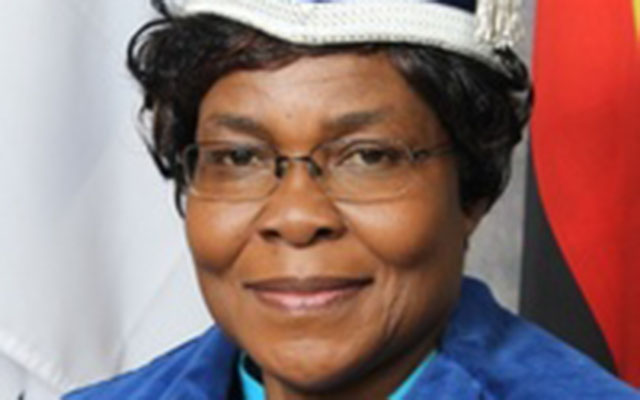Obituary – Prof Kurasha: Woman par excellence!


Prof Kurasha
Victoria Ruzvidzo Business Focus
Obituaries are often steeped in emotion yet the one I pen today is a sober reflection of an iconic woman of our generation. My dispassionate attempt seeks to do justice to her transcendent efforts across multiple disciplines.
Professor Primrose Kurasha was no ordinary woman nor was she a mere academic but she was a well-groomed woman who separated herself from the rest through hard work and, above all, a deep passion to empower others.
She was Zimbabwe’s first woman Vice Chancellor and you can be rest assured it was not through any affirmative action or quota system. Not that there is anything wrong with this as an avenue to correct historical imbalances, but she merited the position as attested to by the Minister of Higher and Tertiary Education, Science and Technology Development Professor Jonathan Moyo in his speech at a church service held for her on Monday.
As the Vice Chancellor of the Zimbabwe Open University, Prof Kurasha gave access to education to many people in this country and across our borders. ZOU has spread its tentacles even to the most inaccessible and war-torn countries such as Afghanistan. Her passion was to ensure that many became empowered through education, making this world a better place.
She was a mother, a wife, an academic, business executive, and a multiplicity of other roles that she discharged effectively spanning decades.
The huge number of people who attended her funeral wake, church services and her burial told a story that here was a woman who impacted the life of others in so many different ways. Everyone had a story to tell. There was just not enough time and microphones for all to share their experiences but you could sense that each and every one of the people that were there wanted an opportunity to be heard.
Many came from as far as the United States to pay their last respects while others sent emails and messages via social media to express their condolences. They described her death as a tragic loss.
Even for me it was not easy to come to terms with her death. Indeed death is too final. I had so much to say to her and good times to share but I believe we shall meet again when Jesus comes back the second time.
Her life was one of sacrifice for others. Her selfless character always gave hope to the hopeless and many found reason to continue living after an encounter with her.
Thousands have attained degrees through her efforts while many others have been empowered in one way or the other.
In her capacity as president and one of the founding trustees of the Professional Women, Women Executives and Businesswomen’s Forum (Proweb) she presided over the introduction of key empowerment programmes and ensured the implementation of projects not just for women high up the ladder but right from the grassroots level.
She had a great passion to see the fairer sex succeed. She would stop at nothing to achieve this. We all knew her at Proweb as a woman who was so determined she would achieve whatever she set her mind to do.
Prof Kurasha was a highly educated woman who mingled with the who’s who in this country and internationally yet she remained so humble and quite humorous even. She cared for the welfare of people in general.
I sat with her on the Proweb board of trustees but never at any point did I feel dwarfed by this whole professor. In fact she made me one of her own to the extent that every morning she would send me inspiring messages that would change the complexion of the day. She did so for many others too.
She was a busy woman who always found time to chat and bring a smile to her compatriots, friends, family and even foes. She would always add flavour to our meetings through her rich humour and wise counsel.
Prof Kurasha was an accomplished woman who attained her professorship in 1999.
She also won numerous leadership awards both locally and international as testimony to her spirit of excellence and hard-work that saw her overcome challenges when they threatened to bring her down somehow.
Her daughter Prim junior said her mum would not be intimidated by any situation but would always emerge victorious no matter the adversity.
Of course her love for God and her desire to be in right-standing with her Maker assured her of victory and shaped her into the awesome woman she was. If ever I were asked to state just one occasion I saw her under the weather or sad in the two decades that we knew each other I would not find even one. She was always in good spirits and yet firm when it came to delivery and discharge of whatever mandate was before her.
As Vice Chancellor she climbed down from her high seat to assist me when some papers were missing to finish finalise my enrolment and I can confidently say she would have done the same to the next person who would approach her. She was motherly.
In many cases people exaggerate as they give grave side eulogies but I must say in Prof Kurasha’s case there was no exaggeration at all. In fact speakers were at pains to find the adjectives that could effectively describe her.
Perhaps the best description of who she was came from her husband Professor Jameson Kurasha who said:
“I want to point out a few things about Primrose as an educator. Primrose was not a gatekeeper. In our culture we have so people who believe that when they succeed, no one else should succeed. She was not like that. She believed that we could ALL make it in life.
“When she set up ZOU, there were efforts from some quarters to shatter her dream. She was investigated five times and five times she was found to be as clean as a whistle,” he said to much applause.
Her brother, Mr Webster Wunganayi also weighed in.
“We grew up working hard and she was an ordinary girl just like any other. But she had ambitions and she taught us that with the right will, one can achieve anything in life.”
Even the Minister of Finance and Economic Development Patrick Chinamasa yesterday placed an advertisement in this paper that eloquently described this awesome woman.
It read in part: “Professor Kurasha will long be remembered for the role she played in advancing delivery of distance education, that way broadening citizens’ access to higher education across the country. Although a leading educationist, she remained humble, maintaining integrity, and steadfast in discharging her mandate”.
Such was the life of the woman who breathed her last On Friday February 17, 2017. It was indeed a life lived well if words from her husband, children, brothers, sisters, colleagues and everyone else are anything to go by. Indeed as Masvingo Provincial Affairs Minister Shuvai Mahofa said, her work at ZOU and in other spheres is there for all to see.
Below is her contribution to my column on October 27 last year on her thoughts for women’s economic empowerment.
“Kiran Mazumdar-Shaw in the article: How can women promote India’s economic development? says, ‘Denying women opportunities to realise their potential is a waste of human capital and bar to economic progress. Women are undoubtedly the foundation of the basic unit of society – the family. Even in traditional roles they demonstrate great innovation, skill, intelligence, hard work and commitment.’
“It is against this background that I say Zimbabwe needs to harness these attributes effectively, to grow a more inclusive and equitable economic environment. Women are natural multi-tasking beings and will naturally survive most economic environments. Almost always, women play a dual role in the society, that is, they produce goods and services and they also have their domestic chores; and, above all that, some of the women are wives and mothers. This is their initial contribution to economic development that has been neglected in many societies. In most societies, women are the custodians of traditional/indigenous knowledge relating to resource management and again provide access to modern technology.
“Women have proved to use micro-finance effectively to develop small enterprises and are recognized as good at paying back loans (Sustainable Development Solutions Network: A Global Initiative, United Nations). Dollar and Gatti,1999 highlighted that ‘societies that discriminate by gender tend to experience less rapid economic growth and poverty reduction than those societies that treat males and females more equitably’. Today, gender equality is no longer a lofty aspiration for economies on the growth path like Zimbabwe; it is the critical missing link for sustainable development.
“As a woman folk it is time to fully embrace gender equality and gender equity to ensure meaningful participation in the economy. Women, the world over, constitute more than 50 percent of the world’s talent base and are known, on average, to reinvest up to 90 percent of income into their households. Given resources therefore, working women would reinvest significantly back into the business and ensure thriving economic environment thereby, fostering the success of their local communities.
“A study by Swamy (2001) found out that women are less involved in bribery than their male counterparts. It concluded that women have higher standards of ethical behaviour and are more concerned with the common good. In that study, it was recommended that increasing women’s presence in public life can reduce levels of corruption and increase sustainable economic development.
“To Johnsson-Latham (2007), strengthening both the gender equality perspective and the voice of women in decision-making, enhancing work on sustainable (economic) development, not least in the leadership sphere is what appears missing. Goetz cited in Sampson (2009) pointed out that corruption functions primarily through all-male networks and in forums from which women are socially excluded. Varley, (2005) has shown that gender is an important determinant of leadership and female leaders tend to share power with staff and use a more democratic approach to leadership than male leaders. (Chiome C, 2013 British Journal of Social Sciences)
“The role of women in Zimbabwe’s sustainable economic development is two fold; that is, making the market work for women and empowering women in the market place. Zimbabwe needs therefore to incentivise companies on the employment of women in leadership positions in order to ‘improve performance and achieve higher profits’.
“Despite what other people may say and believe supporting female empowerment would almost always have positive outcomes and impact on family life and the community for sustainable economic development in Zimbabwe.
“In addition, women induce values and integrity into the workplace. Women are driven by task accomplishment and not the clock. They will work until the task is done,” she wrote.
Go well Prof. Till we meet again!
In God I Trust!
My email:[email protected]/Whatsapp: 0772129972.










Comments